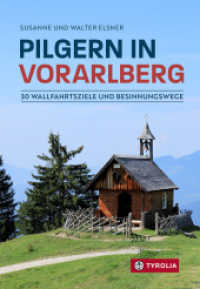Full Description
Transformative Politics of Nature highlights the most significant barriers to conservation in Canada and discusses strategies to confront and overcome them. Featuring contributions from academics as well as practitioners, the volume brings together the perspectives of both Indigenous and non-Indigenous experts on land and wildlife conservation, in a way that honours and respects all peoples and nature.
Contributors provide insights that enhance understanding of key barriers, important actors, and strategies for shaping policy at multiple levels of government across Canada. The chapters engage academics, environmental conservation organizations, and Indigenous communities in dialogues and explorations of the politics of wildlife conservation. They address broad and interrelated themes, organized into three parts: barriers to conservation, transformation through reconciliation, and transformation through policy and governance.
Taken together, the essays demonstrate the need for increased social-political awareness of biodiversity and conservation in Canada, enhanced wildlife conservation collaborative networks, and increased scholarly attention to the principles, policies, and practices of maintaining and restoring nature for the benefit of all peoples, species, and ecologies. Transformative Politics of Nature presents a vision of profound change in the way humans relate to each other and with the natural world.
Contents
List of Tables
List of Figures
Part A: Ceremony and Introduction
Poem
shalan joudry
1. From Politics to Transformative Politics: Wildlife and Species at Risk Policy in Canada
Beazley, Olive, and Finegan
Introducing Disruptions
Finegan
Part B: Barriers to Conservation in Canada
2. A Pathological Examination of Conservation Failure in Canada
Lemieux, Groulx, Swerdfager, and Hagerman
3. Who Should Govern Wildlife? Examining Attitudes across the Country
Williamson, Lischka, Olive, Pittman, and Ford
4. In a Rut: Barriers to Caribou Recovery
Boan and Plotkin
5. Enacting a Reciprocal Ethic of Care: (Finally) Fulfilling Treaty Obligations
McDermott and Roth
Disrupting Dominant Narratives for a Mainstream Conservation Issue: A Case Study on "Saving the Bees"
Colla
The Role of National Parks in Disrupting Heritage Interpretation on Turtle Island
Finegan
Part C: Transformation through Values
6. Reconciliation or Apiksitaultimik? Indigenous Relationality for Conservation
Pictou
7. "Etuaptmumk"/Two-Eyed Seeing and Reconciliation with Earth
McGregor, Popp, Reid, Marshall, Miller, and Sritharan
8. Beacons of Teaching
Young
Indigenous Knowledge as a Disruption to State-Led Conservation
Myhal
The Misipawistik Cree Nation kanawenihcikew Guardians Program
Cook
Part D: Transformation through Actions
9. Transforming University Curriculum and Student Experiences through Collaboration and Land-Based Learning
Zurba, Hache, Doucette, and Graham
10. Ecological Networks and Corridors in the Context of Global Initiatives
Hilty and Woodley
11. The Imperative for Transformative Change to Address Biodiversity Loss in Canada
Ray
Conservation Bright Spots: Focusing on Solutions Instead of Reacting to Problems
Frei
Disrupting Current Approaches to Biodiversity Conservation through Innovative Knowledge Mobilization
Nguyen
Part E: Conclusion and Ceremony
12. Concluding Remarks: Achieving Transformative Change: Conservation in Canada
Olive and Beazley
Poem
shalan joudry
Author Biographies








